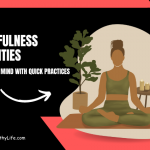
Mindfulness has taken the world by storm, and for a good reason, the benefits of regular mindfulness practice can ease your stress, reduce your depression, and even help improve your memory.
While mindfulness is often used for emotional and mental benefits, there are some ways that mindfulness can improve your physical health.
What is mindfulness?
So what exactly is mindfulness?
Well, mindfulness is the practice of meditation with the goal of awareness. Mindfulness allows you to acknowledge and explore your feelings and thoughts without judgment or action. It is an art of inner reflection and letting go.
Some examples of mindfulness are;
- Guided breathing
- Guided meditations
- Visualizations
Mindfulness is well known for its positive effects on your mental well-being, like reducing stress, relieving anxiety, and improving depression. But let’s take a look at how mindfulness can improve your physical health as well.
Improves sleep
Lack of sleep can cause a host of health issues like heart disease, stroke, lowered sex drive, depression, and weight gain. We all know what it feels like to struggle with a good night’s sleep, so it’s essential to make quality sleep a priority in your life.
If you struggle to get at least seven hours of sleep each night, mindfulness is a great way to improve your sleep cycle.
Research has found that meditation can improve your sleep quality, reduce insomnia, and it has even been compared to sleep medication for its effect on rest.
Supports healthy hair

Photo Credit: Unsplash
If you are experiencing hair loss or hair thinning, you might want to give meditation a try. Meditation is a top holistic remedy for hair loss because it improves circulation, lowers stress, and balances hormones.
Stress and elevated levels of hormones can cause hair loss, so adding meditation to your hair routine can support a healthy head of hair.
If you need a little extra support to grow back your hair, you can also try adding in LLLT. LLLT is a light therapy treatment that regrows your hair, and it can work well with meditation.
Reduces chronic pain
If you experience chronic pain, meditation might be able to help you. In particular, one study found that mindfulness reduced the pain messages in the participant’s brains, which relieved some of their pain.
Some participants were able to reduce or even replace their pain medication with a meditation practice. It is also important to note that mindfulness reduces the anxiety and depression related to living with chronic pain.
Decreases blood pressure

Photo Credit: Pexels
High blood pressure can cause several long-term health issues like heart disease, stroke, kidney disease, and heart attacks. Many Americans experience elevated blood pressure and typically will receive medication and diet changes.
However, researchers at Kent University found that mindfulness practice can reduce high blood pressure, making mindfulness a wonderful treatment for those wanting a more holistic approach to their health.
It’s amazing what mindfulness can do for your body and mind, but it can be hard to get started if you are not sure how to practice mindfulness.
Some easy ways to begin your practice are finding a meditation app, trying out a mediation class at a local studio, or even creating a mindful space at home. Maybe you can grab some essential oils, soft pillows, and other comforts to quiet your mind and spend some time off the screen and unplugged.
Mindfulness is genuinely based on your needs and what makes you feel comfortable, so take your time finding the best practice for you.
About the Author:
Tiffany Fuller is a creator on behalf of illumiflow, Premium Web LLC, The Hope House, and Healing Solutions dedicated to holistic wellness.




![[Infographic] Exploring The Link Between Behavioral & Physical Health Behavioral & Physical Health](https://www.safeandhealthylife.com/wp-content/uploads/2023/10/Behavioral-Physical-Health-150x150.webp)